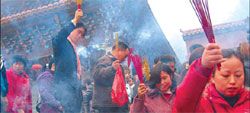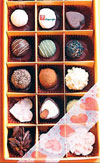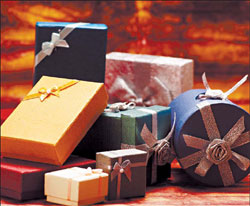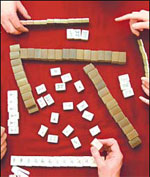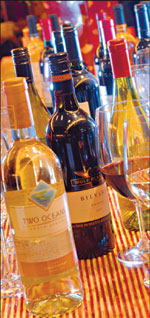Gong Xi Fa Cai !
Pei Yue, university faculty, native of Huludao, Liaoning Province
Like in the rest of China, the younger generations in my hometown have to visit the elderly.
Holding bunches of joss sticks, locals worship in the temple on the first day of Lunar New Year.Wu Chong |
Gifts for old people are something practical such as wine, meat or cartons of drinks. And grandchildren always pick filberts or almonds as gifts for their grandparents so that they can enjoy them together.
I remember at the age of six, I came up with the idea of having my mom buy me a set of Encyclopedia For Students instead of food or clothes.
I also remember one winter in 1993, one countryside friend of my father came to give us festival presents, and I happened to be alone at home. Told to be wary of strangers, I asked him to pass the present through the bars of the door. But to my big shock and surprise, what he tried to stick in was a fat, round-eyed frozen wild rabbit. Later, this friend also occasionally sent us chicken from the mountain and some fresh seafood.
Liu Wei, native of Yancheng, Jiangsu Province
Shrimps and crabs would be the ideal new year gifts in Yancheng, a small city in East China's Jiangsu Province.
Candy and chocolate convey a blessing of "sweeter life" and are always perfect gifts during the festival. File photo |
And these foods don't require the spicy flavorings of Sichuan cuisine to be enjoyed. All that one needs is water, salt, vinegar, and ginger. The water and salt help the cooking, while vinegar and ginger provide the flavorings.
Wu Chong, native of Jianyang, Fujian Province
Fujian Province not only boasts the most dialects but also a wide range of different customs for the Spring Festival. In the coastal areas, including Xiamen and Quanzhou, seafood or cakes top the list of gifts.
In my hometown, which lies in the mountainous north, rock candy and preserved honey dates are almost a must
Spring Festival is also a season of gifts giving like Christmas in the West. |
You can find them sold in every shop, wrapped in square-shaped paper and bound with red plastic ropes. Two bags of rock candy and honey dates convey a blessing of "sweeter life".
On the first day of the Lunar New Year, many local worship in temples. It is usually a grand event, with thousands of pilgrims holding big bunches of joss-sticks and bags of rock candy and honey dates.
They come from all walks of life, and include women, children and the elderly. After a set of rituals, which ends with the lighting of firecrackers, almost everyone will stay back in the temple to partake of a vegetarian lunch.
Zhu Jun, a car company employee, based in Guangzhou, Guangdong Province
In Guangzhou, giving hongbao is very common. It is given not only to kids but also to unmarried adults. Even a person of 40 is entitled to hongbao.
Nowadays, electronic devices such as personal computers, iPODs, MP3, English-learning devices, game players and mobile phones have become popular gifts for youngsters. By giving these gifts, parents expect the young to have fun while remembering to study during the holidays.
Specialty food is also a common gift item and the locals are especially particular about what foods make the cut. The Cantonese are very happy if they get ham from Jinhua, sausages from Dongguan, or Durian from Thailand. Red wines are also gaining popularity.
Guangzhou people also love flowers. Before the Spring Festival, flower markets pop up everywhere. Bamboos and little orange trees are supposed to bring fortune to the family and therefore, always sell the best.
Playing mahjong is a traditional holiday pastime. The money lost or gained is considered as equal to an exchange of hongbao (cash-filled red envelopes). |
In the rural areas of central Hubei, the custom during the Spring Festival is to take some special food while visiting family and friends.
In the past when people were not so well-off, fruit cans, sugar, and some desserts were considered as luxuries and were popular gift items. At that time, the locals could only enjoy such foods on important occasions. Hence, such gifts even now convey care and love.
Currently, locals also exchange wines, cookies, fresh fruits, and sometimes even cigars.
Wu Si, car salesman, native of Beijing
In Beijing, food is the most common Chinese new year gift when visiting parents or relatives. It includes chocolates, sweets, cakes, Chinese ham and fruits. An A3-size paper box of cakes and snacks from Dao Xiang Cun, a popular Beijing brand, is most popular among the elderly.
This tradition goes back some 20 years when only a limited variety of foods was available in the market and it was absolute luxury to have cakes. This box of cakes and snacks is, perhaps, a reminder of days gone by.
In the past, Beijing people also exchanged some home-made food, such as Labasuan (Garlic for Spring Festival).
Weeks before the Lunar New Year's Eve, people would soak several garlic cloves in a bottle of vinegar and seal it. The bottle would not be opened until the Spring Festival began. The garlic and the vinegar would then be eaten with the traditional dumplings.
At that time, Labasuan, if gifted during the festival, was also meant to imply "please repay the debt" because
Wines are gaining popularity in the southern city Guangzhou. |
Even today, most of Beijing's older residents continue the tradition of making and exchanging Labasuan which however, no longer carries the old meaning.
Han Kexiang, a construction company employee, native of Chongqing Municipality
People of Chongqing and Sichuan love their game of cards and mahjong. For them, the seven-day Spring Festival holidays provide the perfect opportunity to indulge in their favorite pastime. The visiting of relatives and friends becomes secondary to getting together for a round of cards or mahjong. The money lost or gained is taken as equal to an exchange of hongbao.
Food remains a popular gift item. Huangba, a dessert made of sticky rice, is a favorite. It is made by soaking the rice in dark sugar water for a while and steaming it before wrapping it with bamboo or reed leaves.
Bamboo shoots, especially those from southern Sichuan region, are also popular during the festival. Fresh shoots are dried before being traded. They are put in water when one is ready to eat them.
(China Daily 02/16/2007 page19)


